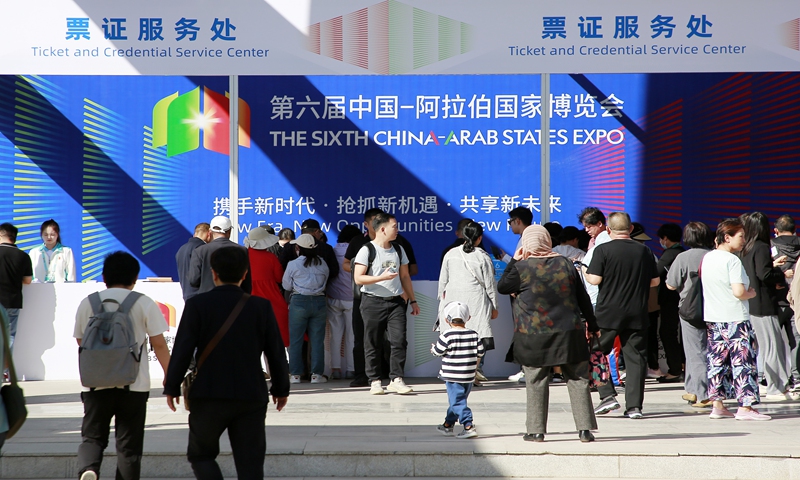
The 6th China-Arab States Expo in Yinchuan, capital of Northwest China's Ningxia Hui Autonomous Region, in September 2023. Photo: VCG
Chinese technology company Lenovo announced on Wednesday its strategic collaboration with Alat, a public investment fund company based in Saudi Arabia, a move that will accelerate Lenovo's global presence while capitalizing on the region's growing momentum for information technology (IT) and business services, the Global Times learned from Lenovo on Wednesday.
In recent years, technological cooperation between China and Saudi Arabia has been extensive, in sectors such as aerospace, digital technology and green energy. These areas have been important fields of cooperation between the two sides in recent years, demonstrating strong complementarity, experts said.
Lenovo's regional collaboration serves as the latest example of how businesses are tapping into the vast opportunities, particularly in the technology sector, as both sides are pursuing the common goal of high-quality development, Chinese experts said.
Against the backdrop of the China-Arab States Cooperation Forum, which marks its 20th anniversary this year, as a significant milestone in bilateral cooperation, more potential for cooperation will be unleashed, experts said.
Lenovo announced the signing of a strategic collaboration framework agreement with Alat on Wednesday, involving technology investment and sustainable manufacturing. This strategic collaboration, alongside a proposed $2 billion investment in zero-coupon convertible bonds, will enable the Chinese company to enhance its presence in the regional and global markets, and increase the geographic diversification of its manufacturing footprint, according to a statement that Lenovo sent to the Global Times on Wednesday.
The deal will also help Lenovo to capitalize on the growth momentum of the IT and business services industry in the Middle East and Africa (MEA), the statement said.
The collaboration includes the planned establishment of a regional MEA headquarters in Riyadh, Saudi Arabia, and a server manufacturing facility in the Middle East country to serve customers in the region, according to Lenovo.
Lenovo plans to build a technology and manufacturing hub in Saudi Arabia and will help define the future of the region as a center of innovation that Alat will benefit from, Yang Yuanqing, chairman and CEO of Lenovo, said in the statement.
Lenovo's case is just the epitome of the closer business cooperation between China and Arab countries as regional countries seek high-quality development and industrial transformation.
At the end of 2023, the China-built Al Dhafra photovoltaic (PV)2 Solar Power Plant was fully completed in Abu Dhabi, the United Arab Emirates (UAE), marking the world's largest single PV power station. This PV power station, built under contract by China National Machinery Industry Corp, increases the proportion of clean energy in the total energy structure of the UAE to more than 13 percent.
Other Chinese technology companies such as Huawei Cloud and SenseTime are also rushing to the Middle East market.
The potential for cooperation between China and Arab countries in the field of technology has become significant, especially in the past two to three years, as both sides pursue high-quality development, Niu Xinchun, executive director of the China-Arab Research Institute of Ningxia University, told the Global Times on Wednesday.
"Gulf states are aiming for industrialization while avoiding outdated production capacity. They are focusing on advanced industries, particularly in digitalization, artificial intelligence, aerospace and pharmaceuticals, and China holds advantages in these areas," Niu noted, referring to the high complementarity between the two sides.
These sectors are relatively mature in China and have not only remained within the realm of scientific research but have also evolved into thriving industries, including digital technology, green energy and aerospace, Yan Wei, a professor at the Institute of Middle Eastern Studies of Northeast University, told the Global Times on Wednesday.




